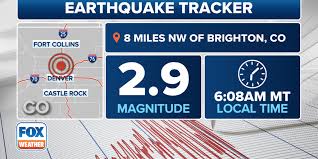A recent earthquake near Dacono, Colorado, with a magnitude of 2.9, startled residents across the region, shaking areas as far out as Denver, about 20 miles away from the epicenter. This unexpected event was not the most significant seismic activity in Colorado in 2025, as a 3.2 magnitude quake previously occurred west of Delta. However, the proximity of the Dacono quake to a densely populated area heightened its impact, with reports of shaking felt even in Thornton and Erie.
According to the U.S. Geological Survey, the earthquake's epicenter was located approximately 3 miles southwest of Dacono, making it a relatively shallow tremor that could be perceived over a wide area. This seismic event serves as a reminder to Front Range residents that despite not experiencing frequent earthquakes, Colorado does sit on numerous fault lines, with five faults identified as active on the USGS National Seismic Hazard Map.
While earthquakes in Colorado are often minor, the region is not immune to more significant tremors. The largest quake in the year leading up to the Dacono event was a 3.4 magnitude earthquake near Salida in October 2024. Although Colorado has a history of seismic activity, the unpredictability of earthquakes makes it challenging to determine when and where the next major event will occur.
The Denver area has experienced seismic instability in the past, notably during the 1960s when a series of earthquakes were triggered by the disposal of chemicals from the Rocky Mountain National Arsenal. This man-made seismic activity led to a significant number of earthquakes along the Derby Fault, culminating in several quakes exceeding a 5.0 magnitude. The strongest recorded earthquake in Colorado history was a 6.6 magnitude temblor in 1882, highlighting the potential for more significant seismic events in the region.
While Colorado's seismic history may not be as notorious as earthquake-prone regions like California, preparing for earthquakes remains crucial. The Colorado Geological Survey stresses the importance of readiness in the face of potential seismic events, as shaking during an earthquake is usually brief, allowing limited time for reaction. Colorado Emergency Management provides recommendations on how to prepare for earthquakes, emphasizing the importance of being proactive and informed when it comes to earthquake safety.
To raise awareness and readiness levels, Colorado hosts the Great Colorado ShakeOut, an annual earthquake drill scheduled for October 16. This event encourages participation from individuals, businesses, and public spaces to practice response actions during an earthquake scenario. By taking proactive measures and participating in drills like the Great Colorado ShakeOut, residents can enhance their preparedness and resilience in the face of potential seismic events in the region.

